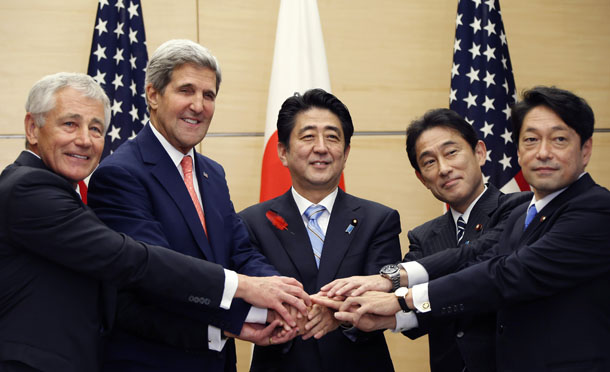(Photo Credit: Reuters)
(BGF) – Recently BU Today published an article by Thomas U. Berger, Associate Professor of International relations at Boston University. In this article Professor Berger discussed the U.S.-Japanese security relationship and China’s increasingly bold actions in the South China Sea. As Professor Berger notes in the article, China’s aggressive maneuvers in East Asia have put a strain on the U.S.-Japanese security relationship. For example, the U.S. reaffirmed its commitment to its security pact with Japan, but only did so orally rather than in writing. This raised some concern in Japan. This comes at a time when Japan feels it is particularly vulnerable to threats from its neighbors. Japan, for its part, has experienced a resurgence of nationalist political leaders who have emerged in the face of the threat from its neighbors. Japan’s resurgence of nationalist political leaders have further exacerbated regional tensions. While the economic interdependence between Japan and China make conflict unlikely, Professor Berger argues that the U.S. must increase its support for Japan in order to prevent Japan from undertaking bold actions that could incite further conflict. Ideally, renewed support could encourage Japan to pursue diplomatic resolutions with its neighbors. Otherwise, Obama’s pivot to Asia could be in peril. To read the full article click here or visit the BU Today website.
POV: Obama’s Asian Pivot in Peril?
By Thomas U. Berger
The American-Japanese security relationship has been the cornerstone of US strategy in East Asia for more than half a century. The Obama administration’s “pivot to Asia,” a multipronged effort to keep the United States active in Asian affairs, depends on keeping that relationship strong. Yet while the two countries are investing considerable effort in strengthening ties, there are signs of growing strain. Left unattended, there is a serious and growing risk of a crisis and even a rupture.
Take the “2+2” meeting held in Tokyo last October, where the two governments began revising the guidelines governing defense cooperation between their military forces. They made progress in underlining their continued solidarity and work toward a closer cooperation to meet new security threats: a nuclear-armed North Korea and a more assertive China. But ambivalence was clear.
While Japan may move toward removing some of the legal barriers to closer cooperation, it wants to avoid becoming too entangled in broader US strategic designs. For its part, the United States offered only lukewarm support on the disputed Senkaku-Diaoyu Islands, which are under Japanese control, but are claimed by China. The US reaffirmed orally that if the islands were attacked, it was bound by the terms of its alliance with Japan to come to its aid, but declined to do so in writing, to the disappointment of some in Tokyo.
Past disputes between the United States and Japan didn’t negate the sense that their strategic interests were in substantial agreement. This time, that is being questioned. North Korean nuclear armament and China’s rise have led to a much higher level of threat perception on the part of the Japanese public than at any point since the end of World War II. Although the Soviet Union had far greater military capabilities, the possibility that Japan would be directly threatened seemed remote. Today’s repeated outbreaks of virulent anti-Japanese sentiments—including riots and mass demonstrations—in Beijing and Pyongyang, even in fellow US ally Seoul, has convinced many Japanese that in the event of a conflict, their closest neighbors are capable and eager to attack them. The Chinese-Japanese standoff over the uninhabited Senkaku-Diaoyu Islands and a less militarized dispute with South Korea over the Dokdo-Takeshima Islands reinforce Japanese fears.
This growing sense of threat has encouraged the reemergence of strongly nationalist political leaders, including Japanese Prime Minister Shinzo Abe, who holds revisionist views on Japan’s World War II-era atrocities that are profoundly offensive to Japan’s Asian neighbors. In a potentially vicious cycle, Japan’s resurgent conservative nationalism alarms its neighbors and feeds anti-Japanese sentiments, leading to a greater sense of threat in Japan and a greater readiness to support nationalist politicians. Washington views this with a mixture of trepidation and despair. It seems inconceivable, given the high level of economic interdependence between Japan and its neighbors and the limited strategic value of the disputed territories, that Japan and China would risk a conflict. Yet political realities in Tokyo and Beijing (and Seoul) have locked the sides into a belligerent stance on the disputed islands that sooner or later could lead to a disastrous conflict.
Washington bears some blame for its tensions with Japan. Its position on the territorial disputes is that such disputes be handled peacefully, according to international law. This legalistic position raises suspicions on all sides. Beijing suspects that the United States is trying to encourage the dispute to more firmly embed Japan into an anti-Chinese coalition. In Tokyo, our refusal to commit more fully raises doubts about our reliability in a crisis.
The United States may judge it has little choice but to carry on with its current policies. Revising Japan-US defense cooperation guidelines sends a strong message to Beijing that aggression is intolerable. It reassures the Japanese that the United States will stand by them in a crunch and may discourage Abe from taking a harder-line stance. At the same time, by not taking a position on the territorial issues, Washington warns Japan that its support should not be interpreted as a carte blanche to be more aggressive about history or other sensitive issues, and leaves open the possibility for constructive dialogue with Beijing.
Click here to continue reading
